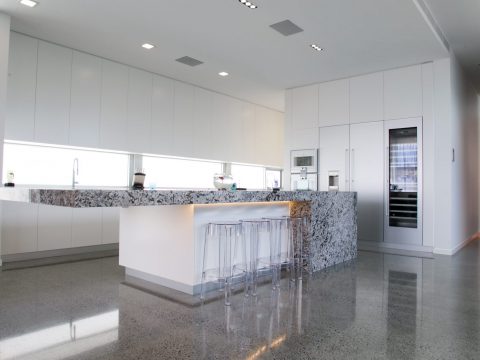Concrete is a popular and durable flooring and surface material for homes and outdoor areas. Whether you’re looking to seal a driveway, patio, or indoor floor, choosing the right concrete sealer is essential to ensure long-lasting protection and aesthetic appeal. With various types of concrete sealers available, it can be challenging to decide which one is best for your specific needs. In this guide, we will walk you through the key factors to consider when choosing the right concrete sealer for your home, with insights into concrete sealing Brisbane and concrete coatings Brisbane services that can help you make an informed decision.

1. What is Concrete Sealing?
Understanding Concrete Sealing
Concrete sealing is the process of applying a protective layer to the surface of concrete to enhance its durability and appearance. The sealer prevents moisture, stains, and other harmful elements from penetrating the concrete, making it more resistant to wear and tear. Concrete sealers also help maintain the aesthetic appeal of the surface by adding a glossy finish, matte effect, or even enhancing the colour of the concrete.
Types of Concrete Sealers
There are several types of concrete sealers available, each with specific benefits and applications. These include:
- Penetrating Sealers: These sealers penetrate deep into the concrete to form a protective barrier against moisture and stains. They are ideal for surfaces exposed to high moisture or freeze-thaw conditions.
- Film-Forming Sealers: These create a thin layer or film on the surface of the concrete, offering protection against stains, dirt, and chemicals. These sealers are typically used for decorative or indoor concrete surfaces.
- Acrylic Sealers: Acrylic sealers are versatile, offering both film-forming and water-repellent properties. They provide a glossy or matte finish and are ideal for both interior and exterior concrete surfaces.
- Epoxy Sealers: Known for their strength and durability, epoxy sealers are ideal for high-traffic areas like garage floors. They offer excellent chemical resistance and create a tough, long-lasting finish.
- Polyurethane Sealers: These are similar to epoxy sealers but tend to be more flexible and resistant to UV degradation. They offer excellent protection for both indoor and outdoor concrete surfaces.
2. Factors to Consider When Choosing the Right Concrete Sealer
1. Purpose and Location
The first step in choosing the right concrete sealer is to consider the purpose and location of the surface you’re sealing. Is it an indoor or outdoor area? Will it be exposed to heavy traffic or moisture? Your choice of sealer will depend on these factors.
- Indoor Concrete Surfaces: If you’re sealing floors, countertops, or walls inside your home, a film-forming sealer (such as acrylic or polyurethane) is ideal. These sealers provide a protective layer while enhancing the appearance of your concrete surface.
- Outdoor Concrete Surfaces: Outdoor surfaces, such as driveways, patios, and walkways, are exposed to the elements. In this case, a penetrating sealer is ideal, as it prevents moisture and stains from seeping into the concrete while allowing it to breathe.
- High-Traffic Areas: If you’re sealing high-traffic areas like garage floors, driveways, or industrial surfaces, an epoxy or polyurethane sealer will provide the strength and durability needed to withstand heavy wear.
2. Aesthetic Preferences
The type of sealer you choose will also affect the look of your concrete. Some sealers offer a high-gloss finish, while others create a matte or satin effect. Additionally, some sealers can enhance or alter the colour of your concrete, making it appear more vibrant or giving it a wet look.
- Glossy Finish: If you want your concrete to have a shiny, polished appearance, go for a glossy acrylic or polyurethane sealer.
- Matte Finish: If you prefer a more subtle, low-sheen look, a matte finish is achieved with certain types of acrylic or penetrating sealers.
- Colour Enhancement: Some concrete sealers are formulated to enhance the colour of your concrete, bringing out its natural tones or giving it a more vibrant appearance.
3. Durability and Protection
Durability is a key consideration when choosing a sealer. If your concrete surface will be exposed to harsh conditions, heavy traffic, or outdoor elements, you’ll need a sealer that offers robust protection.
- High Durability: For surfaces that require maximum protection, such as garage floors or driveways, epoxy and polyurethane sealers offer superior durability and chemical resistance.
- Weather Protection: For outdoor surfaces exposed to moisture, rain, or freezing temperatures, penetrating sealers offer long-lasting protection and prevent damage caused by water infiltration.
4. Drying Time and Application Process
Some concrete sealers are quicker and easier to apply than others. If you’re looking for a low-maintenance solution that doesn’t require long drying times, consider a fast-drying acrylic or polyurethane sealer. For larger areas or surfaces that need multiple coats, ensure you select a sealer that is easy to apply and doesn’t require extensive preparation.
3. Benefits of Concrete Sealing for Your Home
1. Enhanced Durability
One of the main benefits of concrete sealing is the increased durability of your concrete surfaces. Concrete sealing Brisbane ensures that a good sealer will protect your concrete from moisture, stains, chemicals, and everyday wear and tear, ensuring that your floors, patios, and driveways last longer.
2. Easier Maintenance
Sealed concrete is easier to clean and maintain. A good sealer will repel dirt, dust, and stains, making it easier to wipe down or sweep the surface. This reduces the need for frequent cleaning and maintenance, saving you time and effort.
3. Aesthetic Appeal
Sealing your concrete can significantly enhance its appearance. Whether you’re looking to add a glossy shine or create a more natural matte finish, sealing your concrete improves its overall look and makes it more appealing.
4. Increased Property Value
Well-maintained concrete surfaces can increase the value of your property. Sealing your concrete floors or driveways improves their appearance and durability, making them more attractive to potential buyers or renters.
4. Concrete Coatings Brisbane: Why Professional Help Matters
1. Expert Advice
Choosing the right concrete sealer can be challenging, especially with so many options available. Professional concrete sealing services in Brisbane offer expert advice to help you select the best sealer for your needs based on your location, aesthetic preferences, and durability requirements.
2. High-Quality Materials
When you hire a professional for concrete sealing in Brisbane, you can expect high-quality materials and sealers that are specifically designed for the region’s climate and conditions. These experts use premium concrete coatings that provide long-lasting protection.
3. Proper Application
Applying a concrete sealer is an intricate process that requires proper preparation, technique, and equipment. Professional concrete sealing services ensure that the sealer is applied correctly and evenly for optimal results.
Conclusion
Choosing the right concrete sealer for your home is a crucial decision that will affect the appearance, durability, and long-term performance of your concrete surfaces. By considering factors such as the location of the surface, your aesthetic preferences, and the level of protection required, you can make an informed choice that suits your needs. Whether you’re sealing an indoor floor or an outdoor driveway, concrete sealing in Brisbane offers various options, from acrylic and epoxy to penetrating sealers, each with its own set of benefits.
For professional advice and high-quality concrete coatings Brisbane, consider consulting a local expert to ensure the job is done right. With the right concrete sealer, you can protect and enhance your home’s concrete surfaces for years to come.
FAQ
1. What is the best type of concrete sealer for outdoor surfaces?
Penetrating sealers are the best for outdoor surfaces as they protect against moisture and stains while allowing the concrete to breathe, which is essential for outdoor conditions.
2. Can I apply concrete sealer myself?
Yes, you can apply concrete sealer yourself, but it requires proper preparation and technique. If you’re unsure, it’s best to consult with a professional to ensure the best results.
4. Will concrete sealing improve the appearance of my concrete?
Yes, concrete sealing can enhance the colour and texture of your concrete, giving it a glossy or matte finish and improving its overall aesthetic appeal.
5. How long does it take for concrete sealer to dry?
Drying times vary depending on the type of sealer used. Most concrete sealers take 1-4 hours to dry to the touch, but full curing may take up to 24-48 hours.
7. Can concrete sealing protect against salt damage?
Yes, certain concrete sealers, especially penetrating sealers, offer protection against salt damage, which is essential for surfaces exposed to de-icing salts or coastal environments.

